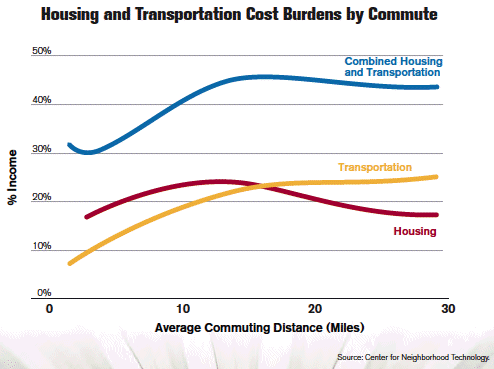This site is used as a homework reference in:
Stoughton High School (Pat Schneider's economics class)
|
|
||||||||||||||||||||||||||||||||||||||||||||||||||||||||||||||||||||||||||||||||
Live close to your job...or pay dearlyLiving farther away is more expensive, not less
This chart shows that living farther away generally costs more, even though housing is cheaper, because of the extra transportation costs. This analysis is for the Washington, D.C. area and is from the report Belway Burden (PDF 16 Mb) by the Urban Land Institute, ©2009 and is reproduced by permission.
A common mistake is to buy a house farther away from work, thinking that you'll save money because houses are cheaper and bigger farther out. The reality is that the longer commute from the 'burbs generally costs you more than you'll save by buying your house there. In fact, each extra mile from work costs you around $100,000 over your working life. A typical working couple living just ten miles farther away from work often forfeits around a million dollars in wealth. That's probably shocking news to you, because most people are unaware of how much the extra driving actually costs them. But I'm sharing that secret with you now. Remember, you read it here first. Yes, homes closer-in cost more. But with your savings from living closer, you can afford to pay more for one. (The calculator below will show you how much more.) If you don't believe me, then listen to Mr. Money Mustache: "If these numbers sound ridiculous, it’s because they are. It is ridiculous to commute by car to work if you realize how expensive it is to drive, and if you value your time at anything close to what you get paid.... [Living closer to work] is probably the biggest single boost that will get the average person from poverty to financial independence over a reasonable period of time. I would say that biking more and driving less was the trigger in my own life that started a chain reaction of savings and happy lifestyle changes that led my wife and I to retirement in our early 30s." Though remember, you don't have to give up your car entirely to reap the monumental savings, you just have to live closer to work. The chart above shows it in graphical form, by displaying the combined housing + transportation costs for the Washington, D.C. metro area. You'll note that as you get farther away from work, your total costs go up, even though the far-away homes cost less. The far-away penalty stops growing once you're about 15 miles away from work, but at that point the penalty is already huge. Of course, everyone's situation is different, and so my calculator below will help you estimate the penalty for living farther from work (and also how much extra you can afford to pay for a home that's closer to your job).
The caveat is that even though
you can afford to buy a bigger house closer in, that doesn't
mean a bank will necessarily give you a loan based on what you
can actually afford. Banks are generally blind to
transportation costs. (Showing your lender this page might
help. Let me know if it does.) Still, if you qualify
for a more expensive, closer house, but you thought you'd save
money by living farther away—now you know better.
There's one other huge benefit to living closer to work: It saves time. You've got only ~70-80 years on this planet, and the less you waste behind the wheel of an automobile the better. Adding just 20 minutes each way on your commute comes out to 167 hours a year. If your time is worth $15/hr. to you, then that's $2500 a year wasted. And there's more: longer commutes are associated with higher blood pressure, obesity, diabetes, cancer, neck pain, loneliness, and higher divorce rates. (US News) So in summary:
This page was inspired by Mr.
Money Mustache's post, "The
True Costs of Commuting".
Last update: November 2013
If you liked this site then you might like some of my other sites: Entire site ©1999-2023 Michael Bluejay Inc. • All information is "use at your own risk" Contact |
|||||||||||||||||||||||||||||||||||||||||||||||||||||||||||||||||||||||||||||||||


